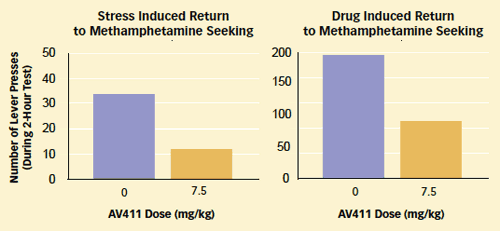A new medication strategy shows promise for preventing relapse to drug abuse, new animal research suggests. Dr. Patrick M. Beardsley at Virginia Commonwealth University, Dr. Kirk Johnson at MediciNova, Inc., and colleagues demonstrated that AV411 (also called ibudilast) reduced methamphetamine seeking in animal models of stress- and drug-induced relapse. Prior work by Dr. Linda Watkins, Dr. Johnson, and colleagues had indicated that AV411 acts as a potent pain reliever while having minimal abuse potential. Other preliminary tests by the Watkins-Johnson team suggest that AV411 reduces the rewards associated with morphine—hinting at the medication's potential as an anti-addiction therapy as well as an analgesic (see "AV411 for Pain Relief Without Opioid Side Effects").
 Medication Attenuates Return to Drug Seeking in Rats Rats that received the medication AV411 sought methamphetamine less avidly in response to either a stressor or a small dose of methamphetamine than those in a control group.
Medication Attenuates Return to Drug Seeking in Rats Rats that received the medication AV411 sought methamphetamine less avidly in response to either a stressor or a small dose of methamphetamine than those in a control group.To evaluate AV411 as a potential relapse medication, Dr. Beardsley trained rats to press levers for methamphetamine self-infusion and then stopped delivering the drug. The rats responded with reduced rates of lever-pressing. When the rats then experienced stress, such as a mild foot shock, or a small injection of methamphetamine, they resumed their high rates of lever pressing, which are considered a sign of relapse. However, if rats were treated with AV411 when their access to methamphetamine self-administration was removed, drug-seeking was significantly reduced in both stressed rats and rats that had received the priming injection (see graph).
AV411 is of special interest to drug developers because, unlike most anti-addiction medications, AV411 affects the brain's glial cells rather than neurons. This different mode of action may avoid side effects caused by other anti-addiction medications.
AV411 is prescribed in Asia to treat asthma and post-stroke dizziness, and it is being tested in Eastern Europe for treatment of multiple sclerosis and in the United States for other neurological conditions. In all of these uses, it has established a good safety profile.
Source
European Journal of Pharmacology 637(1-3):102–108, 2010. [Full Text]
